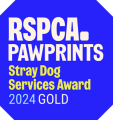Frequently asked questions
Your Most Common Questions Answered
You must call your local dog warden and inform them. There is a very good chance that the owner has already reported their loss and is desperately missing their pet. You can also report your find to the Police on 101
No!
As much as you may like the dog you have found it is not yours. If you find a dog it is illegal for you keep it without reporting it to the dog warden.
If you are interested in offering any stray dog a new home you should inform your Dog Warden who will be pleased to help.
You should call your local dog warden as soon as possible and provide as much information as you can. We are here to help, and may have valuable information concerning your dogs location.
Any unattended dog in a public place is a stray dog. Stray dogs are not only a danger to themselves but can be a risk or cause nuisance to members of the public.
Under the Environmental Protection Act 1990 all local Councils are required to collect stray dogs.
Of course most stray dogs are lost pets who need re-uniting with their owners, but there are unfortunately some owners who allow their dogs to stray again and again. Every dog owner has a responsibility to ensure that their pet does not cause a nuisance to others. This means that as the owner you must comply with certain laws, most of these are straight forward and are there to ensure that people and dogs can live happily and safely together.
On any one day in the England there are around 500,000 stray dogs. These dogs may cause road accidents, fouling offences and attacks on other dogs and people.
If your dog has been picked up, he of she has been removed out of harms way.
The Dog Warden Service is a positive service provided by your local council. It is here to help you, offering help and support when you need it.
The Council do have a fee for stray dogs and it varies between councils and can range from £60 to several hundred.
There are several things you can do to minimize the risk of paying a fee.
- Make sure you dog wears a collar with your name and address attached at all times.
- Make sure your dog is microchipped and the details are up to date!
- Call the dog warden as soon as your dog escapes. We are here to help!!
- Consider the security of your garden
We are well aware that all dogs can escape. We work very hard to keep your lost dog safe. If you are unfortunate enough to pay a fee, remember that your dog is safe and has not been stolen and will be coming home. ALSO YOU CAN AVOID PAYING ANY FEE IN THE FUTURE as above.
Although we can collect fees on behalf of the councils, its important to remember that you are not paying us!! The money goes to the relevant council. This means we have NO POWERS OF NEGOTIATION. ITS NOT OUR FEE. If in doubt please refer to your local authority website.
Contact the Police as soon as possible as they deal with dangerous dog issues.
The Control of Dogs Act 1992 requires that every dog of any age on a highway or in any Public place must wear a collar with the owners name and address inscribed on the collar, or plate or badge attached to it. Failure to comply is an offence.
Under the Microchipping of Dogs (England) Regulations 2015, it is the keeper’s responsibility to ensure that their dog is microchipped, and that their contact details are registered and kept up to date on one of the authorised commercial databases.
Failure to comply could mean a prosecution and a fine of £500.
A Microchip is a small capsule about the size of a small grain of rice that is permanently implanted into your dog.. The Microchip has a unique code that Dog wardens, Vets and other animal welfare organisations can read.
This code relates to a record held by the relevant microchip company with your contact information.
A dog cannot loose a microchip and you cannot forget to put it on, unlike a collar.
Although the microchip doesn’t relinquish your legal obligation to have a collar it can be an extremely useful method of identification.
You as the owner are legally responsible for your dogs actions. If you fail to clear up after your dog you could be breaking the law and could face prosecution, a CRIMINAL record and a fine of up to £1000.
We do not operate our own re-homing centre. However there are a lot of animal rescues in Norfolk and they will all welcome your call.
Please call your local Environmental health department.
Animal Welfare
The Animal Welfare Act 2006 came into effect in England on 6 April 2007 and will provide greater protection for animals.
Section 9 of the Animal Welfare Act 2006 requires a pet owner to be legally obliged to care for their pet properly by providing;
- a proper diet, including fresh water;
- somewhere suitable to live;
- for any need, to be housed with or apart from, other animals;
- the ability to express normal behaviour patterns;
- protection from pain, suffering, injury and disease;
- or (protection from and treatment of, illness and injury)
The majority of people look after their animals perfectly well, but if you suspect that a domestic animal is being cruelly treated, please contact the RSPCA on 0300 1234 999.
The law is not designed to catch people out – only to help protect animals that do not receive proper care.



